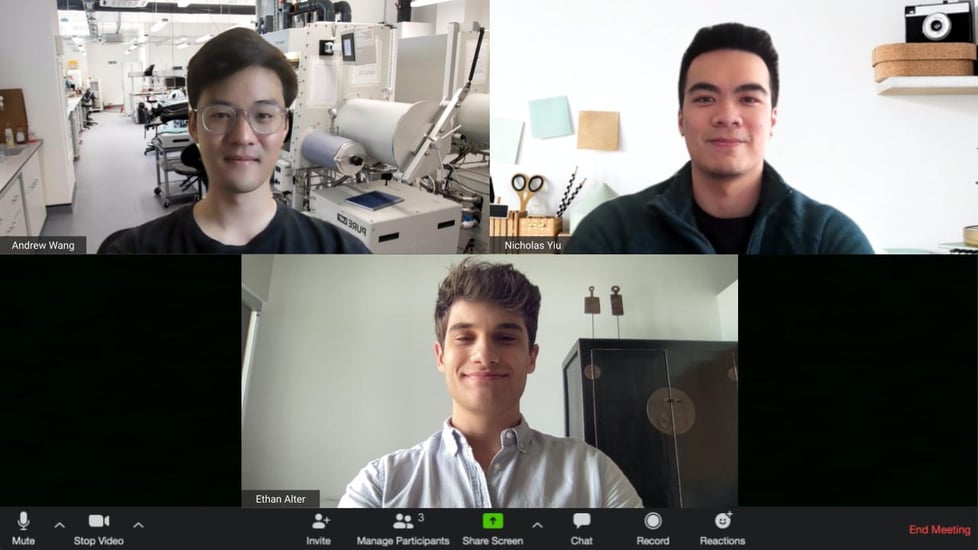
This online news channel offers an insider’s viewpoint as it breaks battery industry news and delivers expert analysis right to your inbox. Meet its busy team – founders Nicholas Yiu and Andrew Wang, and recent addition Ethan Alter.
Forward: features are independent pieces written for Mewburn Ellis discussing and celebrating the best of innovation and exploration from the scientific and entrepreneurial worlds.
Mewburn Ellis Forward: For those readers who aren’t familiar with the term ‘intercalation’, can you tell us why you chose it as a key part of your name? What compelled you to start the project?
Nicholas Yiu: ‘Intercalation’ is a technical description of how lithium ions move within batteries, so the name struck us as a fun way to show how our information moves from our fingertips to your email inboxes!
During the first COVID-19 lockdown and looking for something to fill the time, Andrew [Wang] and I identified a gap in battery-related news and kicked off this project as a way to capture all the battery developments happening in the academic and industrial world. Since then, it’s blossomed into a tight-knit community of readers who are passionate about the industry. Recently, we brought in Ethan to help us grow and create more content.
Another key driver for this project is the spotlight that battery technology has been getting in the last few years. When you have a sea of funding opportunities you get an environment that’s ballooning in a good way, but the industry is also ripe for fraud, with companies overstating what their technology can do. It’s important to us to cover technologies from the eyes of battery scientists and engineers to accurately portray the state of the battery industry.
Mewburn Ellis Forward: For two of you this is not your day job. What are your other roles, and how do you fit the project in?
Nicholas: I work as an Associate Business Manager for UCL Business, the commercialisation company for University College London. We support UCL’s brilliant researchers by taking the IP they develop through their research and creating ‘real-world’ products or services that ensure their work has the greatest possible impact, whether that’s through licensing to an existing company or creating an entirely new spinout company. Fortunately, Intercalation Station fits well with my role, specifically in battery fields, but also in related applications like automotive and electronics. It adds to my ability to advise our researchers on the sector and give a broader perspective and understanding on the industry.
Andrew Wang: I’m currently completing my PhD with the Monroe Research Group at the University of Oxford and take part in the wider Faraday Institution Multi-Scale Modelling project. I spend a lot of time in the lab doing research on next-generation lithium-ion battery electrolytes. Working at the frontiers of research involves focusing on the minutiae of one’s particular subfield, which means it's easy to lose track of how the wider industry is moving. With so much going on in the field of lithium-ion batteries, the Intercalation Station project fits quite nicely onto my plate because it provides context for how my research might apply to the real world and helps me keep tabs on the bigger picture.
Mewburn Ellis Forward: What are the top three technology trends you have observed in the course of your reporting, and which is the most intriguing?
Andrew: There are many competing trends in the battery space. The first is the optimisation of traditional lithium-ion from both a mass manufacturing and application integration standpoint. The second is the commercialisation of emerging technologies that have been brewing in academic labs and R&D departments for the past decade; think solid state, or lithium metal. The third would be the class of batteries that may not be appropriate for electric vehicles (EVs) but that have great potential in decarbonising energy storage in the grid, such as flow or air batteries.
We think the most exciting race is between the first two trends. While both are vying for the biggest slice of the pie in the automotive sector, many automotive manufacturers will hedge their bets and aggressively try to commercialise unproven battery technologies in the hope that they will offer big returns and help achieve their ambitious 2025 EV goals.
Mewburn Ellis Forward: What might be the main rival to lithium-ion (Li-on) in the coming decades? Is there genuinely a technology that could supplant Li-ion batteries in EVs, for instance?
Nicholas: Over the next 10 years, I expect Li-on to be the dominant technology for high-density energy storage applications. Lithium is number three on the periodic table, so it’s very light and packed with energy. Also, Group 1 elements can easily add and remove electrons to create a flow of electrons (electricity), so it will be challenging to overthrow lithium. However, there are definitely shortcomings for lithium, such as higher costs, certain safety issues and supply issues with materials. While it’s not a direct competitor, sodium-ion could become more mainstream in the next decade at a lower cost and for lower-energy solutions. One of the largest battery manufacturers, CATL, recently announced its new sodium-ion batteries, which could work with Li-on batteries when integrated into the same pack. This is a very exciting announcement for the company.

The Intercalation Station team: Nicholas Yiu, Andrew Wang, and Ethan Alter.
Mewburn Ellis Forward: Ethical sourcing, sustainability and recycling are hot topics. To what extent are these issues being addressed? Can we expect to see ethical considerations overtake cost concerns any time soon?
Ethan Alter: In the past couple of years we’ve seen automakers and battery suppliers begin to address the darker side of battery production in their marketing and press releases, from announcing the use of blockchain technology to track the provenance of conflict-prone metals to partnerships between EV companies and high-profile battery recycling start-ups. Measures such as these are definitely a step in the right direction towards ensuring a more ethical and sustainable industry, but many more like them are needed to get us to where we need to be.
Ultimately, I believe government regulation is the greatest driver behind the push for ethical sourcing and sustainability. Studies and directives developed by organisations such as the UN and the EU have been crucial to shining a light on shortcomings in the industry, as well as providing a framework to address them. Pressure from national and local governments has also been key to pushing automakers to adopt more sustainable practices and ditch fossil fuels in the first place.
Governments also have the important role of monitoring the industry and ensuring that the measures taken to achieve sustainability are carried out correctly. If enforcement is missing, sustainability efforts can be compromised. As an example, battery recyclers currently operate with little oversight, and many have adopted cheap methods that have serious potential downsides, such as unrecycled components and environmental damage from pyrometallurgy and hydrometallurgy.
Incentives such as subsidies can be used by governments to help promote more robust recycling methods. Without a sure profit motive, the recycling of the majority of battery materials will remain unfulfilled. Contributing to a reduction in the cost of recycling will help ensure it takes place properly.
When it comes to cost, my cynical answer is that this will remain the main consideration unless regulation forces the industry to adopt more ethical practices. One example of where I think this is particularly evident is the phasing-out of cobalt in lithium nickel manganese cobalt oxides (NMC) and lithium nickel cobalt aluminium oxides (NCA) chemistries. While ethical concerns surrounding the exploitation of child labour in the Democratic Republic of the Congo have been trumpeted by companies as the motivation behind this shift, I think it really has to do with the rising price of cobalt and its growing scarcity. If you’re in charge of the long-term planning of an EV business, rocketing cobalt prices are an obvious crisis you’d like to avoid. It’s the same with nickel, which has resulted in the recent uptick in the development of cobalt-and-nickel-free cathode chemistry.
“The majority of our readers are actively working and thinking about ethical sourcing and sustainability for their company, which is promising”
On a more positive note, I believe that the scientists and engineers working on batteries are deeply concerned about these issues and would themselves like to see a more ethical industry develop. A survey of our readers supports this idea. We recently asked how important the ethical sourcing of battery materials is for their companies when compared with the bottom-line cost, using a scale of 1-5 with 5 being the most positive answer. Of a total of 44 participants, 20 (45%) gave a score of 4 or 5 (positive), 16 (36%) gave a score of 3 (neutral), and 8 (18%) gave a score of 1 or 2 (negative), showing that the majority are actively working and thinking about ethical sourcing and sustainability for their company, which is promising.
Mewburn Ellis Forward: Is there enough investment in the battery/energy storage space? Where is the bulk of investment coming from? Where are there gaps?
Nicholas: The investment landscape for battery tech (and climate tech in general) has been rapidly expanding over the past few years. According to one climate tech newsletter, the first six months of 2021 saw $10bn in new dedicated venture capital across 31 funds globally. We’re seeing more funding in the form of strategic investors with deep pockets – including venture arms for manufacturers, financial institutions (including banks and pension funds) and blue-chip corporations expanding into climate funds.
The biggest challenge with investing in battery technology is that it honestly takes ages to get from lab research to a commercial level and traditional investors may view the opportunities as too risky. That’s why I’m excited to see a lot more early-stage translational funding from universities investing at the high-risk stage. I work closely with the UCL Technology Fund, a £100m fund investing in UCL research and a bridge between seed and later-stage funding. Also notable are MIT’s The Engine, Cyclotron Road and Northern Gritstone. All these sources of capital are really healthy for the ecosystem. It’s a great time to be an entrepreneur in the battery space.
"I’m excited to see a lot more early-stage translational funding from universities investing at the high-risk stage. It’s a great time to be an entrepreneur in the battery space”
Mewburn Ellis Forward: You’ve alluded to the problem of fraud in the industry. Can you say a bit more about this subject?
Nicholas: Fraud is a strong word and every case will be different, but I feel like it’s particularly prevalent in battery technology. A lot of it has to do with the climate and battery tech boom that we’re currently in. There’s a golden opportunity to become a leader in the battery and EV space right now and it’s being turbocharged by the government's climate policy. Capital markets are really looking to generate returns from this industry movement and, ultimately, there can be a mismatch between expectations and commercial reality. For one thing, companies may overstate the capabilities and future potential of their technologies based on early-stage sample prototypes. They may be overly optimistic on timelines and overpromise in order to raise funding, secure partnerships and grab headlines. Second, battery technology is complex, and investors may overlook things like scalability and manufacturability and take shortcuts, so they don’t miss a ‘once in a lifetime opportunity’ for the next new ‘breakthrough’ technology. This leads to misguided investment decisions and irresponsible use of capital.
There’s such a bright future ahead for batteries, and it would be a shame to see this decade littered with companies that failed to deliver or opportunities that were overlooked. I see a few ways we could create a healthy investment and commercial climate moving forward.
First, battery start-ups raising money could share more data for due diligence and to give a holistic picture of product performance. This would reduce the issues coming from overstated claims or unreasonable projections. Concrete data is key to accurate decisions. Similarly, milestone-based investments that are appropriate with the technical stage can help mitigate key technical risks.
Second, I think news writers can be too liberal with terms like ‘breakthrough’ and ‘groundbreaking’, which can give unrealistic signals to the industry. I’d love to see more accurate reporting on the pros and cons of these technologies, with professional input from battery experts.
Finally, professionals with links to universities can help emerging technologies by providing business and ethics training to academic researchers on how best to commercialise the technology, helping them to create the most impactful company.
Mewburn Ellis Forward: Finally, the fun part. What is the most satisfying aspect of the project for each of you?
Nicholas: I love capturing the career origin stories of engineers and scientists. It’s important to cover the diverse talent within the field and share career-path stories with other early-career professionals to help inspire the next generation. I’m also inspired myself by seeing founders build something that follows on from their research, and see more academics choose the entrepreneurial role. Great examples are: Dr Thomas Heenan (pioneering fast charging for batteries with the MagLiB project); Dr Tom Mason (with unique PCBFC™ fuel cell technology at Bramble Energy), and Dr Toby Cubitt (addressing quantum computing for battery materials modelling at Phasecraft).
Andrew: For me, it’s definitely about being in the middle of this fervour in the field of batteries and capturing all the exciting work by scientists, engineers, commercialisation teams and others. At the same time, it's great to share the right perspectives to help maintain a healthy community and ecosystem.
Ethan: My favourite part of writing for Intercalation Station is sharing a perspective that isn’t often found in the media covering this industry. As scientists ourselves, we’re able to write about press releases, scientific publications and the industry at large with a more critical eye than most.
Read more Mewburn Ellis insights on energy storage technologies and become an Intercalation Station subscriber.
Sam is a Partner and Patent Attorney at Mewburn Ellis. He works principally on chemistry and materials science patents. Sam has extensive experience drafting new patent applications and coordinating prosecution and grant worldwide. He also regularly represents clients at EPO oppositions and appeals. Sam has a particular interest in Supplementary Protection Certificates (SPCs) and leads our SPC group.
Email: sam.bailey@mewburn.com
Sign up to our newsletter: Forward - news, insights and features
Our people
Our IP specialists work at all stage of the IP life cycle and provide strategic advice about patent, trade mark and registered designs, as well as any IP-related disputes and legal and commercial requirements.
Our peopleContact Us
We have an easily-accessible office in central London, as well as a number of regional offices throughout the UK and an office in Munich, Germany. We’d love to hear from you, so please get in touch.
Get in touch

